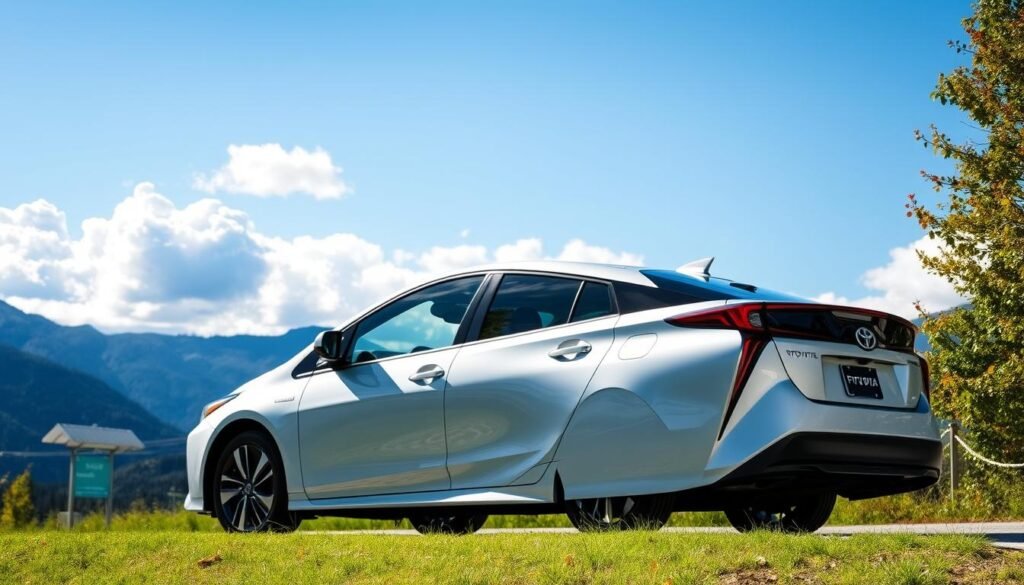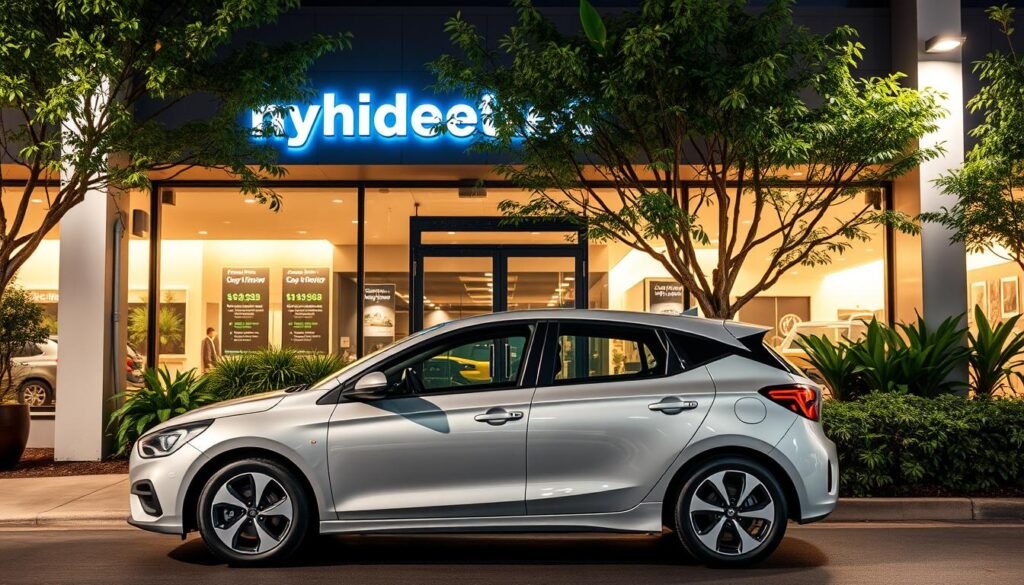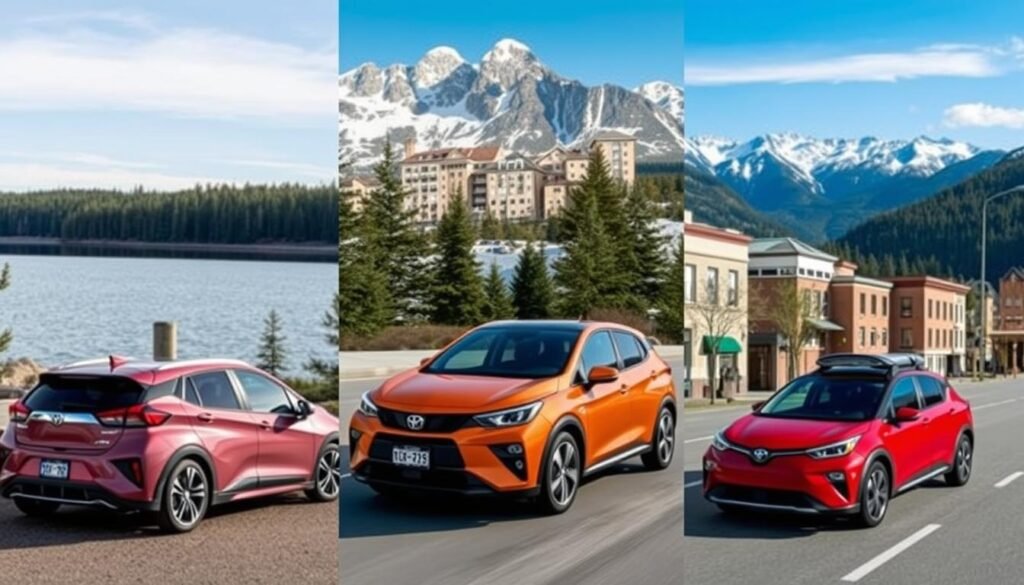Did you know that hybrid vehicle sales in Canada have surged by over 50% in the last three years? This rapid increase highlights a significant shift in consumer preferences towards eco-friendly transportation. Hybrid compact cars, in particular, have gained popularity. They offer a unique combination of fuel efficiency, cutting-edge technology, and a compact footprint.
In our examination of the 2023 market, we delve into the leading hybrid models. We explore what makes them stand out. Whether it’s their environmental benefits or superior fuel economy, these vehicles are reshaping our perception of driving and sustainability.
Key Takeaways
- Hybrid compact cars are seeing significant growth, with sales increasing over 50% recently.
- These vehicles offer a combination of fuel efficiency and eco-friendliness.
- Top hybrid models are equipped with advanced technology for enhanced driving experience.
- Canadian consumers are leaning towards sustainable commuting options.
- Compact designs make hybrid vehicles practical for urban living.
- The market for hybrid cars continues to evolve with new innovations.
Introduction to Hybrid Compact Cars
The automotive sector’s evolution has spotlighted hybrid compact cars for their cutting-edge technology and practical advantages. These vehicles, powered by a combination of an internal combustion engine and an electric motor, represent a significant move towards sustainability. Grasping the mechanics behind hybrid vehicles illuminates why they stand out as a compelling option for consumers.
What Makes a Car Hybrid?
Hybrid cars integrate two power sources: a conventional gasoline engine and an electric motor. This synergy enhances fuel efficiency and minimizes emissions. When the vehicle accelerates or demands power, the electric motor engages, conserving fuel. Regenerative braking recharges the battery, ensuring a smooth driving experience.
Benefits of Hybrid Technology
Adopting hybrid technology offers substantial advantages. Hybrid vehicles not only improve fuel efficiency but also emit fewer emissions than traditional cars. Many drivers benefit from financial incentives, such as tax incentives designed to promote greener choices. The long-term benefits of hybrid cars include environmental sustainability and cost savings.
Why Choose a Compact Car?
Choosing a compact car offers distinct benefits. These vehicles are adept at navigating urban landscapes, making them perfect for city residents who value compact car advantages like easier parking and lower costs. Despite their smaller size, compact cars efficiently handle traffic, providing sufficient space for passengers and cargo. This combination appeals to eco-conscious consumers seeking a practical yet comfortable option.
Overview of the Canadian Market for Hybrid Compact Cars
The Canadian hybrid market is undergoing a transformative phase, driven by shifting consumer preferences and a growing demand for fuel-efficient vehicles. As fuel costs remain volatile, Canadians are increasingly drawn to cars that offer superior efficiency and long-term cost savings. This trend highlights the need to grasp the current market dynamics and consumer inclinations.
Trends in Fuel Efficiency
Canadians are now more focused on fuel-efficient hybrids than ever, a response to the escalating fuel prices. This shift is underscored by technological advancements, which have significantly enhanced hybrid vehicle performance. Hybrid models are engineered to optimize fuel economy, attracting both eco-conscious buyers and those seeking financial savings. The proliferation of hybrid options across various brands has made it simpler for consumers to find a suitable model.
Consumer Preferences in 2023
In 2023, the Canadian hybrid market is characterized by a strong emphasis on advanced technology, performance, and eco-friendliness. Consumers are now seeking vehicles with:
- Advanced safety systems, which enhance driver confidence.
- Connectivity options that ensure seamless integration with mobile devices.
- Eco-friendly materials used in the interior design of hybrid vehicles.
As environmental concerns intensify, consumers are valuing the sustainability of their vehicle choices more than ever. Automakers are adapting by introducing new models that align with these preferences, while maintaining the fuel efficiency benefits of hybrids.
Best Hybrid Compact Cars of 2023
The 2023 market for hybrid compact cars is booming, presenting a wide array of choices for those prioritizing eco-friendliness. Among these, several models emerge as leaders, distinguished by their performance, efficiency, and adaptability. These top hybrid models integrate cutting-edge technology with intuitive features, positioning them as prime selections for consumers.
Toyota Prius
The Toyota Prius is a cornerstone in the hybrid vehicle sector, celebrated for its outstanding fuel efficiency. It boasts an estimated 54 mpg combined, catering to those seeking to minimize their environmental footprint. Its ample interior and cargo space cater to both families and commuters, while its advanced safety features offer enhanced peace of mind. Hybrid car reviews frequently commend the Prius for its dependability and forward-thinking design.
Honda Insight
The Honda Insight is lauded for its modern aesthetic and dynamic performance. Its hybrid powertrain delivers around 52 mpg combined, ensuring a pleasurable driving experience. The Insight’s interior is adorned with high-quality materials and a thoughtful layout, elevating its overall feel to a premium level. Its cost-effectiveness is a recurring theme in user feedback, solidifying its status as a leading hybrid compact car.
Hyundai Ioniq
The Hyundai Ioniq combines practicality with efficiency, achieving a combined fuel economy of about 58 mpg. Its contemporary design and user-centric technology enhance its allure. The Ioniq offers generous cabin space and an intuitive infotainment system, catering to a broad spectrum of drivers. As a standout among top hybrid models, it is celebrated for its versatility and value, positioning it as a formidable contender in the hybrid market.
These models represent the pinnacle of hybrid compact cars in 2023, addressing the needs of those who value both performance and efficiency. For a more in-depth exploration of these vehicles’ features and specifications, delve into detailed hybrid car reviews. These resources offer valuable insights from both consumers and experts.
Detailed Review: Toyota Prius

The Toyota Prius emerges as a vanguard in the hybrid sector, marrying unparalleled efficiency with outstanding performance. This segment explores the pivotal elements of the Toyota Prius review, spotlighting its hybrid car attributes and Toyota safety ratings.
Performance Features
The Toyota Prius is equipped with a 1.8-liter hybrid engine, offering a harmonious fusion of power and fuel economy. It boasts a total output of up to 121 horsepower, ensuring a dynamic driving experience while maintaining superior fuel efficiency. The vehicle achieves an estimated 54 mpg in the city and 50 mpg on the highway. Its use of a continuously variable transmission (CVT) guarantees smooth acceleration and deceleration, enhancing comfort for both urban and long-distance drives.
Interior and Comfort
Upon entering the Prius, a meticulously designed cabin welcomes you. The interior design is characterized by an open layout, featuring premium materials and generous headroom. It accommodates five passengers comfortably, making it ideal for family excursions or daily commutes. The integration of a 7-inch touchscreen display offers user-friendly navigation and connectivity. The control layout is designed for ease of use, ensuring seamless access while driving.
Safety Ratings
In the realm of Toyota safety ratings, the Prius consistently excels in crash tests. It earns high accolades from entities like the IIHS and NHTSA, underscoring its dependability. Outfitted with advanced safety features such as adaptive cruise control, lane departure alert, and automatic emergency braking, the Prius places a premium on occupant safety. These hybrid car features underscore the vehicle’s commitment to safety, providing drivers with peace of mind.
Detailed Review: Honda Insight
The Honda Insight emerges as a standout in the hybrid compact segment. This review delves into its performance, comfort, and safety ratings, highlighting its efficiency and driving experience. It is a prime choice for those seeking a balance of performance and comfort.
Performance Features
The Insight is powered by a 1.5-liter four-cylinder engine and an electric motor. This synergy delivers strong performance and exceptional fuel efficiency. The transition between electric and gasoline power is seamless, ensuring a smooth drive. Its responsive handling and direct steering make city driving effortless.
Interior and Comfort
The Insight’s interior is designed for comfort, featuring a spacious layout. High-quality materials enhance the cabin’s sophistication. The infotainment system, with its intuitive interface and smartphone connectivity, adds to the driving pleasure. Ample legroom and cargo space make it practical for diverse lifestyles.
Safety Ratings
The Insight boasts impressive safety ratings, thanks to its advanced safety features. Honda Sensing technology includes collision mitigation braking, lane-keeping assist, and adaptive cruise control. These features improve the driving experience and offer peace of mind. Its crash test results from leading organizations assure buyers of its safety.
Detailed Review: Hyundai Ioniq
The Hyundai Ioniq emerges as a formidable player in the hybrid compact car market. This review delves into its standout performance, expansive interior, and outstanding safety ratings. Its captivating design and cutting-edge hybrid technology make it an excellent choice for those seeking a greener driving experience.
Performance Features
The Hyundai Ioniq showcases exceptional performance, courtesy of its hybrid technology. It is powered by a responsive 1.6-liter engine and an electric motor, blending power with efficiency seamlessly. Its fuel economy is commendable, appealing to those looking to cut down on fuel costs. The regenerative braking system further boosts efficiency and minimizes brake wear.
With its smooth, quiet ride and swift acceleration, the Ioniq excels on both urban and highway routes. It offers a commendable balance of power and efficiency, making it a top contender in its class.
Interior and Comfort
The interior of the Hyundai Ioniq is a testament to thoughtful design, focusing on passenger comfort and practicality. The spacious cabin, adorned with premium materials, creates a modern and welcoming environment. Ergonomic seating ensures ample room for both front and rear passengers.
The infotainment system is user-friendly, integrating smartphones and offering intuitive controls. This combination of functionality and comfort makes the Ioniq perfect for both daily commutes and extended trips.
Safety Ratings
The Hyundai Ioniq shines in the safety department, boasting impressive safety ratings. It comes with a suite of advanced safety features, including adaptive cruise control, lane-keeping assist, and automatic emergency braking. These features significantly enhance driver awareness and accident prevention.
As a result, the Ioniq has excelled in crash tests conducted by leading industry standards. Hyundai’s commitment to safety is evident, ensuring a secure driving environment for all.
Comparing Fuel Efficiency Among Top Models
When evaluating hybrid compact cars, fuel efficiency stands out as a critical factor. A detailed comparison highlights the performance of models such as the Toyota Prius, Honda Insight, and Hyundai Ioniq. Each vehicle demonstrates exceptional hybrid car efficiency, thanks to their advanced technologies and strengths. We will delve into their MPG ratings and electric range to understand their differences.
How They Stack Up
- Toyota Prius: Boasts an impressive MPG of up to 56 combined and an electric range of approximately 25 miles.
- Honda Insight: Offers around 52 MPG combined, with an electric range of about 17 miles.
- Hyundai Ioniq: Renowned for its efficiency, it reaches up to 58 MPG combined and boasts an electric range of 29 miles.
Pricing and Financing Options

Grasping hybrid car pricing is crucial for potential buyers. The market showcases a range of hybrid compact cars, each with unique price tags. Typically, prices start around $25,000 to $35,000, influenced by model and features. Models such as the Toyota Prius and Honda Insight stand out, offering efficiency and affordability.
Average Price Ranges
Below is a pricing overview for some well-known models:
- Toyota Prius: Starting around $28,000
- Honda Insight: Starting around $27,000
- Hyundai Ioniq: Starting around $24,000
Many seek out financing options that align with their financial capabilities. Leasing and loans are prevalent, with rates varying by credit score and lender. Dealerships also offer unique financing deals to attract buyers.
Available Incentives in Canada
Canadian buyers can leverage various Canadian incentives for eco-friendly vehicles. These include federal tax credits, provincial rebates, and initiatives to lower emissions. Rebates can be as high as $5,000, contingent on vehicle qualifications. For the latest on hybrid deals, visit this link.
Utilizing these incentives can notably decrease the cost of owning a hybrid. As the market shifts, financial support remains vital in boosting hybrid car appeal. It’s essential for buyers to stay updated on incentives and financing options to optimize their investment.
Environmental Impact of Hybrid Compact Cars
The shift towards hybrid compact cars highlights substantial environmental advantages. As Canadians increasingly weigh the ecological implications of their vehicle choices, the critical role of these cars in fostering sustainability becomes clear.
Emissions Reduction
Hybrid compact cars exhibit significant emissions reduction compared to conventional gasoline vehicles. They combine an internal combustion engine with electric propulsion, resulting in lower tailpipe emissions. Research indicates that hybrids can drastically cut down on greenhouse gas emissions, leading to cleaner air and a healthier environment. This is especially crucial in urban settings, where air quality is often compromised by high traffic volumes.
Eco-Friendly Manufacturing
Manufacturers are increasingly embracing sustainable manufacturing to reduce their ecological impact. They focus on ethically sourcing materials, minimizing production waste, and harnessing renewable energy in their facilities. Brands such as Toyota and Honda are leading the way by ensuring their hybrid compact cars’ lifecycle embodies environmental stewardship.
User Experiences and Testimonials

Canadian drivers’ real-world insights into hybrid compact cars offer invaluable knowledge. Their feedback often highlights the benefits and potential concerns of hybrid technology. This showcases a range of driver experiences, painting a comprehensive picture of ownership.
Ratings from Canadian Drivers
Hybrid car reviews reveal positive ratings from users across various platforms. Many Canadian drivers appreciate the fuel efficiency and eco-friendly aspects of these vehicles. Here are some common sentiments:
- High satisfaction with savings on fuel costs.
- Positive remarks on the smooth driving experience.
- Appreciation for advanced technology and safety features.
Common Feedback and Concerns
User testimonials reflect a variety of opinions regarding hybrid compact cars. Although many drivers express enthusiasm, some concerns remain prevalent:
- Some users reported issues with battery life and replacement costs.
- Concerns about limited trunk space compared to traditional cars.
- Mixed reviews on the availability of service centers specializing in hybrid technology.
The Future of Hybrid Technology
The future of hybrid technology is brimming with potential for both automotive enthusiasts and those prioritizing environmental sustainability. As the need for eco-friendly transportation escalates, so does the scope for hybrid innovations. Key advancements in battery technology, the use of lightweight materials, and energy-saving systems are pivotal in defining the trajectory of hybrid compact cars.
Innovations on the Horizon
Industry leaders are venturing into several pioneering areas for hybrid vehicles. These include:
- Solid-state batteries which offer quicker charging and extended battery life.
- Advanced regenerative braking systems to enhance energy capture.
- Artificial intelligence integration for better energy management.
These hybrid innovations are set to elevate the performance and efficiency of future models. They promise to make driving more pleasurable and environmentally friendly.
Predictions for Hybrid Compact Cars
Experts foresee a continued surge in popularity of hybrid compact cars, with a broader range of models catering to diverse consumer needs. As the focus on sustainability intensifies, hybrid options will expand, incorporating the latest technology and boosting fuel efficiency. Informed choices regarding safety features will increasingly influence consumer decisions. Analysts predict that by 2030, hybrids will command a significant portion of the automotive market, reflecting a growing preference for green vehicles.
In summary, the trajectory of hybrid technology is highly promising. With continuous progress and positive forecasts, the development of hybrid compact cars will pave the way for a more sustainable and efficient transportation landscape.
Tips for Choosing the Right Hybrid Compact Car
When contemplating the purchase of hybrid cars, it is essential to assess multiple factors to make an informed choice. Understanding your personal needs and preferences is crucial for a fulfilling ownership experience. Here are some critical considerations to bear in mind.
What to Consider Before Buying
Several factors should guide your decision before making a purchase. Here are some useful tips for selecting hybrids:
- Budget: Determine your financial capacity, including down payments and monthly payments.
- Fuel Efficiency: Compare mileage ratings to assess long-term cost savings.
- Driving Range: Evaluate your daily driving distance and ensure the hybrid meets your needs.
- Features: Assess critical features such as safety ratings, technology integration, and interior comfort.
- Resale Value: Research expected depreciation rates to understand long-term value.
Test Driving and Evaluations
Test driving hybrid cars is a vital step in the buying process. Direct interaction with the vehicle allows you to assess its performance and comfort. Here are some tips for test driving:
- Comfort: Focus on seating ergonomics and cabin space.
- Acceleration: Test the car’s response to the accelerator for quickness.
- Technology: Explore the car’s infotainment system for ease of use.
- Noise Levels: Observe the quietness of the cabin at various speeds.
Maintenance and Care for Hybrid Vehicles
Maintaining a hybrid vehicle necessitates specific attention to ensure optimal performance and longevity. Regular hybrid car maintenance is essential, focusing on both the electric and gasoline components unique to these cars. Proper care for your hybrid can prevent costly repairs and enhance your driving experience.
Service Recommendations
Servicing hybrids involves several key practices. It is crucial to follow the manufacturer’s recommendations for servicing intervals. These often include:
- Regular oil changes
- Battery health checks
- Brake system inspections
- Tire rotations to ensure even wear
These services maintain the vehicle’s efficiency and ensure durability over time. For more detailed information, consider browsing maintenance tips specific to hybrids.
Do-It-Yourself Tips
For those keen on DIY car care, several basic maintenance tasks can be performed at home. Here are some tips to manage your hybrid effectively:
- Check tire pressure regularly to promote fuel efficiency.
- Inspect and replace cabin air filters to ensure airflow and comfort.
- Monitor fluid levels, especially coolant and brake fluid.
- Maintain cleanliness of the battery terminals to prevent corrosion.
Engaging in these simple tasks can significantly prolong the life of your vehicle. Understanding the specific needs of hybrids leads to effective servicing hybrids in the long run.
Conclusion: The Appeal of Hybrid Compact Cars
As we conclude our discussion on the increasing popularity of hybrid compact cars in Canada, it’s crucial to highlight the benefits of hybrid compact cars. These vehicles are gaining traction among environmentally aware consumers. They seek a balance of efficiency, performance, and comfort. The appeal of these hybrids will undoubtedly intensify as fuel prices increase and environmental consciousness grows.
Final Thoughts for Potential Buyers
For those considering a purchase, the hybrid car appeal transcends mere financial benefits. It represents a choice that benefits both your wallet and the planet. Each model caters to diverse lifestyles, ensuring a hybrid compact car suits nearly everyone. When exploring options, consider performance, comfort, and safety ratings as part of your buying guide.
Emphasizing the Benefits
The advantages of hybrid vehicles, such as improved fuel efficiency and lower emissions, are significant. The market provides a wide range of choices, meeting various needs and preferences. Moreover, as the benefits of hybrid compact cars become more widely acknowledged, consumers are more inclined to make eco-friendly choices. These choices come with the added benefit of fuel savings.
In conclusion, now is an ideal time to consider transitioning to a hybrid compact car. With numerous options and substantial benefits available, this choice can significantly enhance your driving experience. It offers a more sustainable and cost-effective option.
FAQ
What are hybrid compact cars?
Hybrid compact cars integrate a conventional internal combustion engine with an electric motor. This combination enhances fuel efficiency and minimizes emissions. Their eco-friendly attributes and compact dimensions make them ideal for navigating urban landscapes.
Why should I consider buying a hybrid vehicle?
Opting for a hybrid vehicle brings numerous advantages. It leads to lower fuel expenses, diminished environmental impact through reduced emissions, and potential tax benefits. Additionally, hybrids are equipped with cutting-edge technology, contributing to long-term financial savings.
Which are the best hybrid compact cars of 2023?
The 2023 lineup of hybrid compact cars includes the Toyota Prius, Honda Insight, and Hyundai Ioniq. These models are celebrated for their distinct attributes, superior fuel efficiency, and state-of-the-art hybrid technology. They stand out as premier options in the market.
How do I choose the right hybrid car for my needs?
In selecting a hybrid car, evaluate your budget, desired driving range, and the vehicle’s environmental credentials. Testing various models is crucial to gauge comfort, technological sophistication, and handling. This approach ensures an informed decision.
What is the average price of a hybrid compact car?
The cost of a hybrid compact car varies based on the model and its specifications. Generally, they fall within the ,000 to ,000 CAD range. Nonetheless, financial assistance and government incentives can significantly lower the initial investment.
What are the common maintenance needs for hybrid vehicles?
Hybrid vehicles necessitate routine maintenance akin to conventional automobiles, encompassing oil changes, brake inspections, and tire rotations. Their unique battery systems and regenerative brakes, however, demand specialized care, best handled by certified professionals.
How do hybrid cars contribute to environmental sustainability?
Hybrid cars significantly diminish greenhouse gas emissions relative to traditional gasoline-powered vehicles. Their enhanced fuel efficiency translates to reduced fuel consumption, thereby lessening dependence on fossil fuels and diminishing the carbon footprint.
What hybrid technology features should I look for?
When examining hybrid technology, focus on regenerative braking, energy-efficient battery systems, advanced driver assistance systems, and connectivity features such as infotainment and smartphone integration. These innovations not only elevate the driving experience but also boost fuel efficiency.
